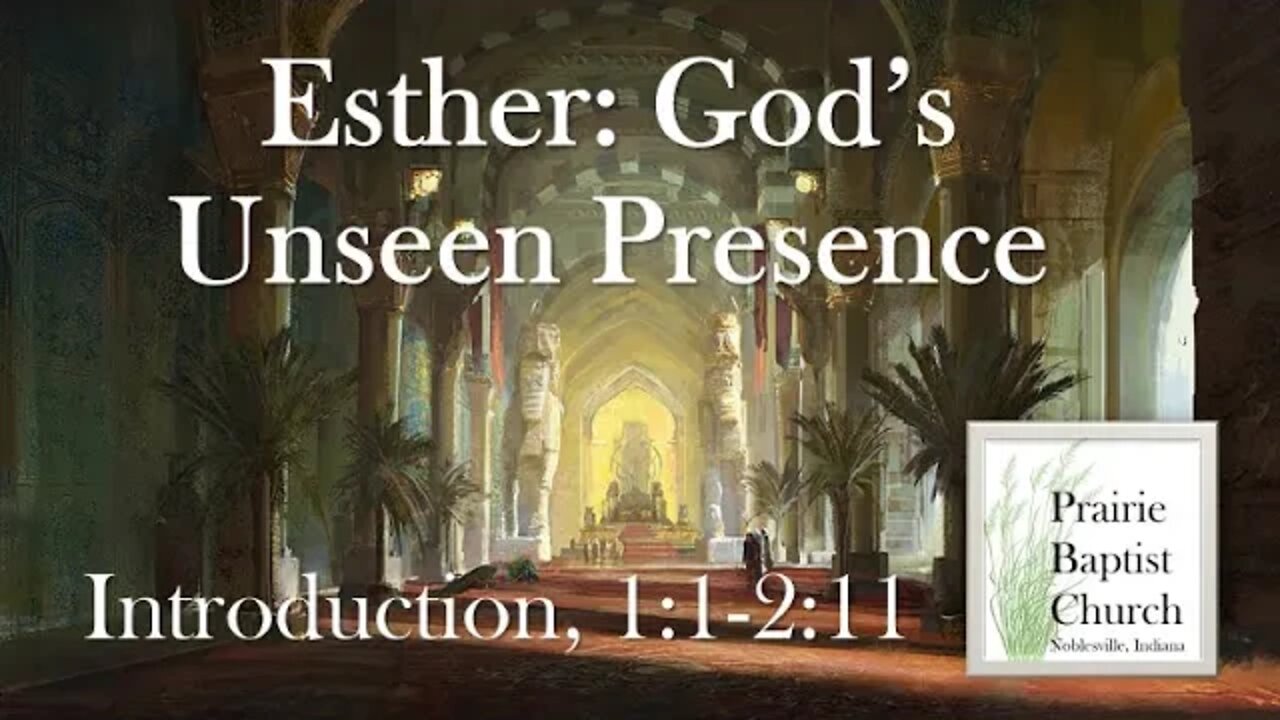Premium Only Content

Esther: God's Unseen Presence, Introduction
Today, we are beginning a new series through the Book of Esther. This is going to be challenging, for several reasons.
First, we are a Gospel-preaching church, and it takes more work to unpack the Gospel from the Old Testament. It is in there, but it isn’t as easily accessed as “For God so loved the world that He gave His only-begotten Son that whosoever believes in Him should not perish but have everlasting life.” In the Old Testament, we read promises of the Messiah—the Rescuer, and we see types and pictures of the Gospel—instances like David standing between God’s people and certain doom; but we don’t see Jesus’ finished work.
Second, Esther is especially difficult because it is the only book of the Bible that doesn’t invoke God’s name. At all. Even in the most well-known passages, Mordecai doesn’t say that God put her there for such a time as this, and before Esther goes uncalled for to the king, she tells her people to fast, but not PRAY TO GOD! There have been discussions on whether this book should even be in the Bible. If I have you wondering, it should be included in Scripture.
God is present, even if unseen. He is working throughout the events, guiding and directing. Even beyond the scope of the narrative, we can see God’s providential hand in Persia's recorded history.
In my study this week, I came across research done by George Barna that suggests that only 6-10% of Americans have a truly Biblical worldview. About half think they have one, but only 6-10% do. Much of this has to do with that fact that many professing Christians don’t know the Scriptures well enough to have a truly Biblical worldview.
And this is why we take books like Esther head-on. Many reject the historicity of Esther seeing it as a historical fiction. Many young Christians know something about the Jewish orphan who became queen and saved her people, but they know nothing about God’s subtle workings and guidance throughout, nor do they know anything about the Gospel message presented in the story.
Over the next few weeks, we will unpack this book. We will see the invisible God working. We will see how God’s people can live and serve Him in a pagan land. We will see God continue revealing His plan of salvation even in passages that do not name His name.
-
 31:34
31:34
Friday Beers
1 hour agoOur Horrifying Night Drunk Ghost Hunting the Manson Murders
1.37K1 -
 2:15:28
2:15:28
Barry Cunningham
3 hours agoPRESIDENT TRUMP MAKES SPEECH ABOUT AI
38.8K14 -
 1:25:34
1:25:34
Kim Iversen
2 hours agoEpstein to Empire: Scott Horton Unpacks the Lies That Led Us Here
82K38 -
 53:22
53:22
Candace Show Podcast
4 hours agoBREAKING! Brigitte Sues Me For Defamation | Candace Ep 218
61.3K138 -
 LIVE
LIVE
Mally_Mouse
8 hours agoLet's Hang!! - P.O. Box & Chill - WE HIT 10,000!!!
105 watching -
 LIVE
LIVE
Quite Frankly
7 hours ago"Pharma in Schools & Russia OP Revived!" ft Barbie Rivera 7/23/25
506 watching -
 LIVE
LIVE
The Mike Schwartz Show
3 hours agoTHE MIKE SCHWARTZ SHOW Evening Edition 07-23-2025
4,153 watching -
 1:00:00
1:00:00
BEK TV
21 hours agoREAL TALK, REAL SOLUTIONS: FINANCIAL FREEDOM AND LIFE ADVICE ON THE RAMSEY SHOW
1.21K -
 12:03
12:03
Chrissy Clark
7 hours agoIs Stephen Colbert’s Firing “MAGA Cancel Culture”?
2.63K3 -
 1:48:16
1:48:16
Redacted News
4 hours agoSomething BIG is happening in Ukraine, new CIA coup? Putin launches new massive offensive | Redacted
148K51